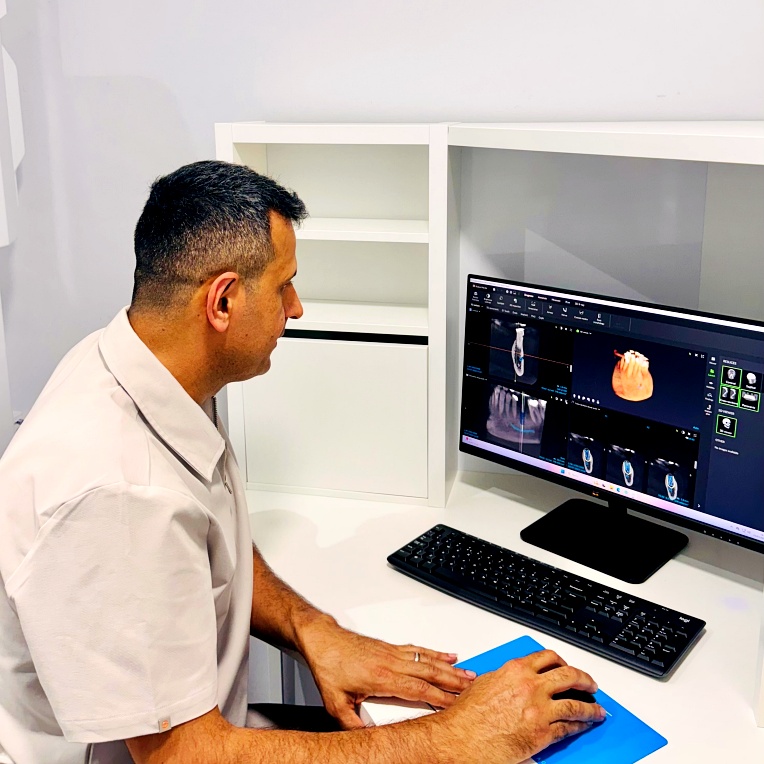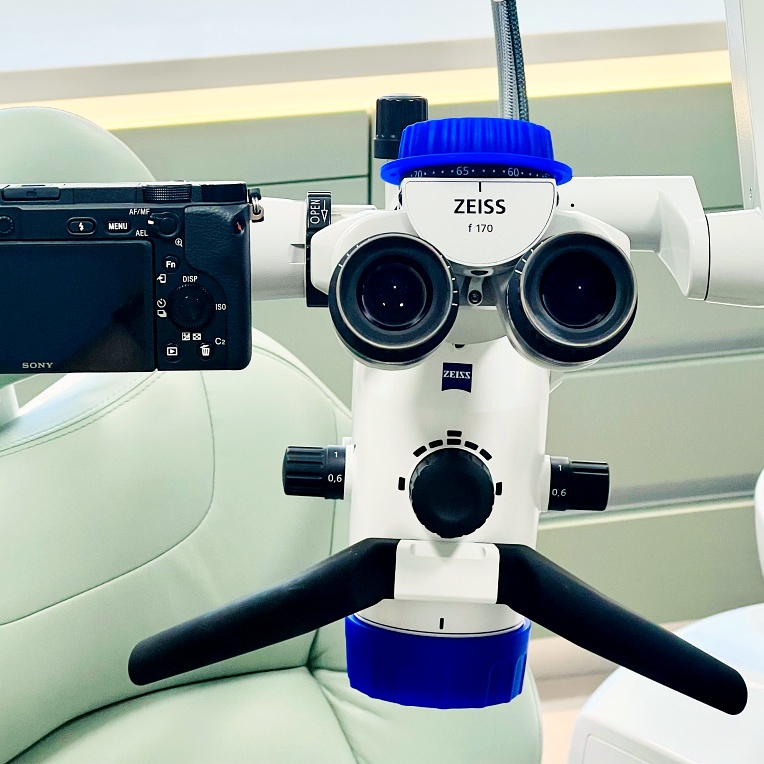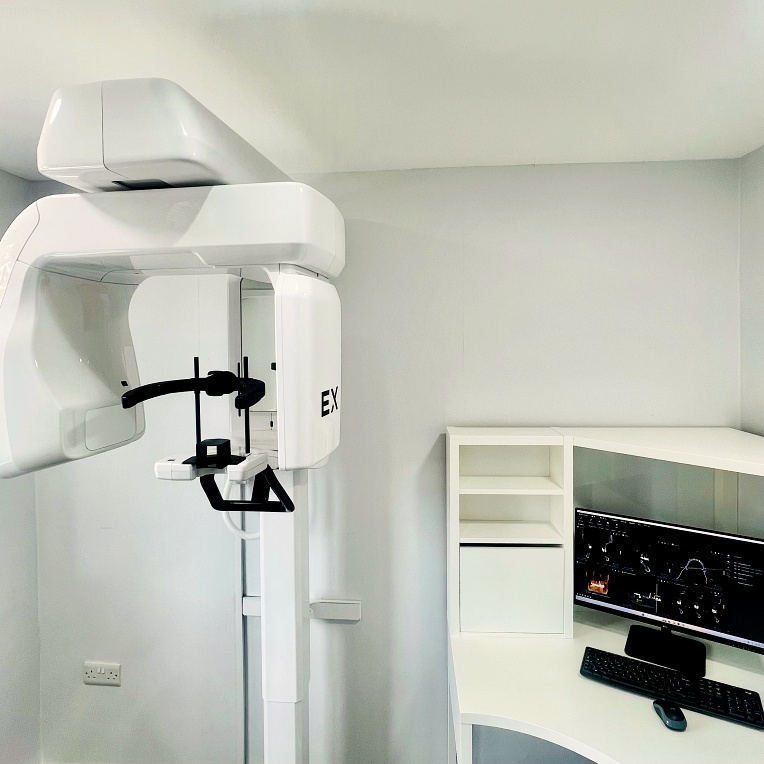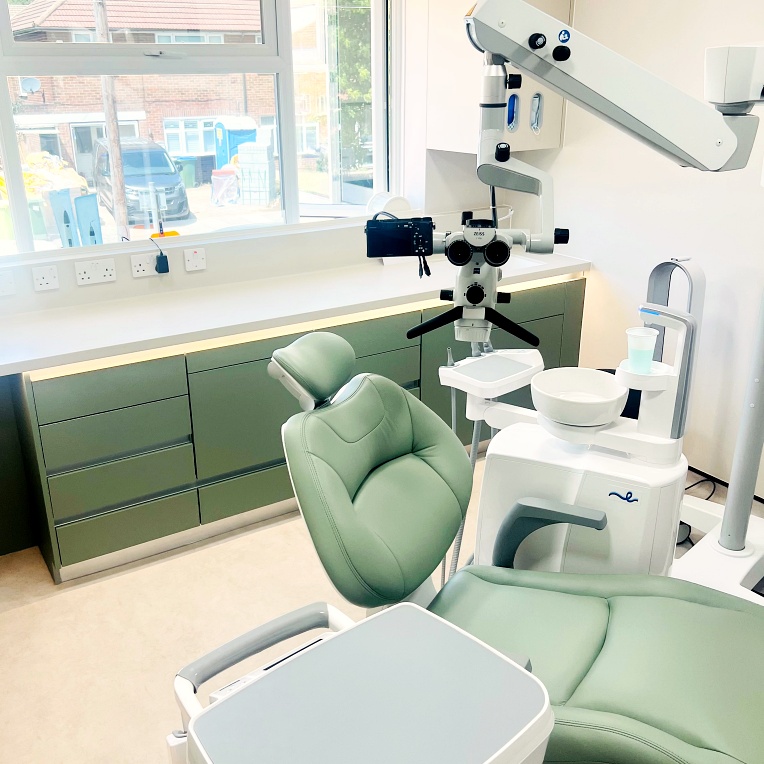Are dental implants expensive?


Dental implants are an investment not just in your future oral health but also in your emotional well-being, ability to eat the foods you love, and ability to speak with the clarity you deserve.
Whilst it is possible to get cheap implants, unfortunately, in many cases, more affordable materials are used, the planning stages are rushed, and post-operative complications are common as sterilisation techniques are not as rigorous as in clinics such as ours.
We appreciate that implants are an investment, and it is up to each patient to decide if the improvements to quality of life, function, confidence, and appearance are worthwhile.
Our dentists will be completely transparent about what’s involved in the implant process and explain how implants can transform your overall well-being. As responsible professionals, we will also explain the limitations and potential risks of the surgery.
Is dental implant treatment painful?


This is one of our patients’ most common concerns.
When planned and executed by an experienced implant dentist, the implant surgery is straightforward and painless. We will use a local anaesthetic to numb the gum, so you should only feel some light to moderate pressure as the dentist places your implant.
We also offer intravenous (IV) sedation to help relax nervous patients, which induces a state of total relaxation, and renders your anxiety redundant – it’s also very common not to remember the procedure under IV sedation.
The more credentialed and experienced your implant dentist is, the more likely the surgery will go smoothly and swiftly. We always recommend researching the implant dentist’s experience at any given dental practice before you proceed with treatment.
Am I suitable for dental implants?


Many patients are surprised to learn that they are eligible for implants despite factors such as their age, general health condition, and the length of time they have been living with missing teeth.
To assess your suitability for dental implants, you must undergo a complete evaluation, X-ray and CBCT scan.
We encourage you to make an appointment with one of our implant dentists to discuss implant treatment and all of your possible options.
If I need an extraction before implants, will I have a gap in my smile?


In the past, many people were put off getting implants because of being left with a gap in their teeth after an extraction.
If the gap in your smile is at the back of the mouth, we do not generally recommend fitting a temporary tooth. However, for gaps at the front of your smile (that are more visible), we can place a temporary tooth after a tooth extraction, so you won’t have to worry about a gap in your teeth disrupting your smile’s appearance while your jaw heals.
If all of your teeth require removal prior to implant surgery, we will place a temporary set of teeth so you don’t have to worry about living without the capacity to chew, bite, and smile while you wait for the next step in your implant journey.
What is the time frame for getting a dental implant?


This can depend on the complexity of the case we are treating, which can be influenced by the condition of your mouth before treatment and how many teeth are being replaced.
The average time is generally between 3 and 6 months from the very first appointment to having your new and long-term set of teeth placed over the top of your implants.
Another factor that can influence the timeframes is whether or not a bone graft is needed prior to implant surgery to build up healthy bone. This can add 3-6 months to the process. Trust us when we say it’s worth the extra months, as you will have a new set of teeth that truly behave like real teeth.
Once you have consulted, we can give you an accurate timeline for your implant journey.
Do implants every fail, and is there any guarantee?


Any surgical procedure can have complications, and dental implants are no exception. When a dental implant is placed, your bone needs to grow onto and fuse to it. This process is known as ‘osseointegration’.
In the unlikely event that your bone fails to grow onto an implant, we offer the choice of either a full refund or to replace the dental implant completely free of charge. We generally find that patients wish to try again, and that a second failure is infrequent.
To maximise the success of your implant surgery, we strongly recommend refraining from smoking and engaging in a healthy oral hygiene routine (flossing and brushing twice daily).
Do I have to have any teeth out before my implant surgery?


The first stage of tooth replacement is a full assessment of your mouth and jaw. We take X-rays, photos, and digital scans to see exactly what’s happening in your mouth.
Should we find signs of severe infection or gum disease, the affected teeth may need to be removed and replaced with implants.
I’ve had missing teeth for many years – am I suitable for implants?


This isn’t usually a barrier to entry for treatment with dental implants.
At Moltons Dental, we have worked with patients who have very little jawbone. The solution is to create new and healthy bone with a bone graft.
During your consultation, we will use 3D imaging software to ascertain the amount of bone available, whether it is capable of hosting an implant, and consider the next steps.
In the (very rare) cases where a bone graft is not possible or you would prefer not to have one, we can explore other options to help you achieve a full smile again.
Can you replace all of my teeth with dental implants?


Yes. Using a procedure known as ALL-on-X (X referring to the number of implants used), a small number of strategically angled implants can secure a whole set of teeth in place.
You will have four or more implants, and a 10–14-unit bridge will be fixed on the implants to restore your smile and function.
Our dentists use the very latest 3D scanning and digital imaging technology to:
- Find the optimal areas of bone in your jaw that will best support an implant in the long term. This is key to providing long-term results for our patients.
- Reduce the cost of your treatment. 3D imaging software allows us to find the areas of the jaw with the most volume and angle the implants so that fewer implants are required (you won’t need one per tooth) to support a full mouth of teeth. This cutting-edge process is known as ‘All-on-4—teeth in a day’ implants.
Read about full-mouth implants here.
My dentures are slipping around in my mouth – can implants help?


A million times, yes!
At MOLTONS, implants are a massive force for good when combined with dentures. They can provide replacement tooth roots so that dentures stay solidly in place. No more slipping and sliding teeth going rogue when you chew, bite, or laugh.
If this sounds familiar, we encourage you to come in and see us at MOLTONS. An exaggeration to say implant dentures are immeasurably more effective and toothlike than standard dentures.
Thanks to implants, your jaw will no longer suffer from shrinkage, a common problem with non-implant-based treatments. This is not only in your health’s interest, but it can also help retain more facial volume, giving your face more vitality and youth.
Who are dental implants for?


Dental implants can be suitable for patients who:
- Have one or more teeth failing due to gum disease or a dental infection.
- Don’t have healthy supporting teeth to wear a dental bridge.
- Have had to have a tooth removed due to a dental injury.
- No longer want to put up with uncomfortable/ill-fitting dentures.
- They feel that their confidence levels and well-being are being affected by living without teeth.
What can I expect from implant surgery and the procedure journey?


It’s normal to be nervous before your implant surgery (and indeed before surgery).
Our compassionate clinical team and Treatment Coordinator will do everything possible to make you feel relaxed and confident about having a smooth experience before your implant surgery.
You will be greeted by our friendly team, who will ensure you are comfortable.
Your implant dentist will explain what to expect from the procedure again (they will have previously explained this during your consultation) and ensure you understand, feel calm, and have no further questions.
If you have opted for IV sedation, please follow the pre-op instructions given to you.
Your dentist will numb the area with local anaesthetic and ensure you are fully numb and comfortable. The procedure is then carried out by your implant dentist.
Please note that your appointment slot for implant surgery is longer than needed to ensure you are not rushed, have ample time to recover, and for your dentist to ensure the anaesthetic is functioning as it should. It generally takes 15 minutes to place a single implant, so the surgery is very short.
We observe great precision when placing implants, and our dentists are trained in gentle, minimally invasive methods. We also don’t use any tools that create potentially off-putting noises (think high-pitched dental drills!). Everything we do before and during your implant surgery is sensitive not just to the physical well-being of our patients but also to their emotional welfare and needs.
In most cases, a small metal cap is adhered over the top of the implant to aid with the healing process and prevent further surgery. Your dentist may also place some dissolvable stitches. These can be removed after 1-2 weeks if you are experiencing any discomfort due to the stitches.
Once your implant has been placed, we will provide written and verbal aftercare instructions, including how to clean your mouth after surgery. Remember that we are only a phone call away if you are unsure or worried about anything after your surgery. We will also provide you with an out-of-hours contact number in case of emergencies.
Thanks to the expertise of our experienced implant dentists, you should experience only very minor (if any) discomfort following your implant surgery. In the vast majority of circumstances, any post-operative pain can be controlled with over-the-counter painkillers. Your dentist may prescribe antibiotics if clinically appropriate.
We will book you for an appointment 2 weeks after your implant surgery to review your healing progress. Approximately 3-4 months later, we will ask you to come back to have an impression of your tooth taken, which will inform the unique design of your new tooth. Once your new tooth has been created (1-2 weeks after your impression-taking appointment), we will ask you to come in to have your final restoration (crown, dentures or bridge) fitted.
Please note that every case is individual, and the length of time it takes to plan and carry out treatment varies from patient to patient. We will give you an itemised overview of the projected timeline and what to expect at every stage of treatment.
How do I prepare for my implant surgery?


Please observe the following instructions in preparation for your implant surgery:
- Eat as much as you can before your procedure.
- Avoid alcohol on the day of your procedure.
- If you are undergoing your IV sedation procedure, please arrange for a chaperone to accompany you home. Please do not drive on the day of surgery after your appointment.
How to prepare for sedation?


- Eat a light meal at least 4 hours before your appointment
- Keep hydrated with clear fluids up to 2 hours before our appointment. Please do not eat or drink anything after this time (unless your dentist at Moltons has advised it).
- Do not smoke 24 hours before your appointment..
- Do not take any recreational drugs or drink alcohol for 48 hours before your appointment.
- Avoid drugs that will cause lethargy (hayfever tablets/tablets for cold and flu/Valerian tablets/opiate-based painkillers)
- Whilst you can attend the practice alone, we will ask you to leave the name and number of a responsible adult who will be your escort home after the procedure. Our reception team will contact them to let them know when to come and escort you home.
- The responsible adult must be able to take you straight home.
- The responsible adult should remain with you for the rest of the day following your surgery.
- Please be aware that you will not be able to drive yourself home on the day of surgery. If you feel better the next day, you are able to drive—just make sure you are not too tired or feeling unwell.
- Please remove false nails and nail varnish. They could interfere with the monitoring equipment used during sedation-based treatments.
- Wear loose-fitting clothing and flat shoes. We recommend a short-sleeved top or jumper; we must attach a blood pressure monitor throughout.
- Please advise us as to whether you could be pregnant – we cannot proceed if this is the case.
- Nursing mothers – please do not breastfeed for 24 hours after the procedure.


















